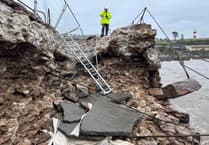DEVON County Council (DCC) is urging road users to take extra care today, Tuesday, January 2, after the Met Office issued an Amber Wind Warning across northern Devon and a Yellow Weather warning across the rest of the county.
They have forecasted high winds and the possibility of disruption across northern Devon from the first named storm of the year, Storm Henk.
The warning is from late morning to around 10pm tonight, however the peak of the storm in Devon is expected between midday and mid-afternoon.
During that time a spell of very strong winds in the north of the county is expected with gusts of 70-80 mph likely on some coastal areas.
And across the rest of Devon there is the possibility heavy rain and localised flooding.
Drivers should expect longer journey times and rail, road, air and ferry services may be affected. Drivers of high sided vehicles should take extra care in the winds.
Some roads and bridges could close and damage to some buildings is likely, such as tiles blown from roofs.
Flying debris is likely and there is a chance that power cuts may occur, with the potential to affect other services, such as mobile phone coverage.
If you must drive, you can do this more safely by driving slowly to minimise the impact of wind gusts, be aware of high sided vehicles/caravans on more exposed roads and be cautious when overtaking, and give cyclists, motorcyclists, lorries and buses more room than usual.
If you are on the coast, stay safe during stormy weather by being aware of large waves.
The winds could bring down trees and block roads; the storm will also blow leaves off trees which could then block gullies and drains, leading to localised highway flooding.
The public should not walk or drive through flood water as there is a risk of engines becoming inundated or encountering manhole covers that have been dislodged or are missing.
Devon Highways has placed teams on standby to deal with any issues that may arise.
Devon County Council is reminding people of the following advice:
• Be alert to fallen trees and branches, particularly on minor roads where they may not have been reported;
• Consider if your journey is essential and be alert to weather warnings;
• Allow additional time for your journey, never drive through floodwater or swollen flowing water, you don’t know how deep it is. Find an alternative route;
• Reduce your speed and leave more space between you and the vehicle in front and leave plenty of room if you’re overtaking;
• Drive with care and according to the conditions.



.jpeg?width=209&height=140&crop=209:145,smart&quality=75)

Comments
This article has no comments yet. Be the first to leave a comment.